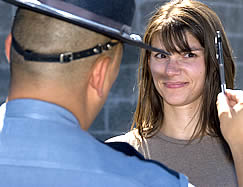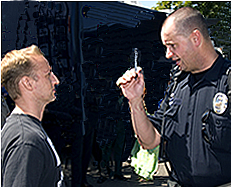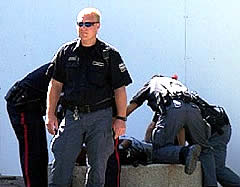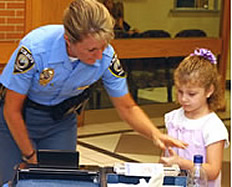| |
 |
 |
 The
Drug Influence Evaluation is
a medical test made up by traffic policemen.
DIE tests are administered by police who call
themselves Drug Recognition Experts.
The
Drug Influence Evaluation is
a medical test made up by traffic policemen.
DIE tests are administered by police who call
themselves Drug Recognition Experts.
A DRE officer stops a driver, and suspects drugs. The DRE examines the driver, looking for supposed physical "indicators" of the presence of various drugs. The officer concludes that the driver is impaired by a drug, orders forced blood testing, and—before the results come back— predicts the presence of a drug belonging to a particular drug category.
![]() Then,
when the blood test does come back showing that
drug, the officer's amazing prediction is taken
as proof that the driver must have been
impaired by that drug. How else could the
officer have made that amazing prediction? [Here's how.]
Then,
when the blood test does come back showing that
drug, the officer's amazing prediction is taken
as proof that the driver must have been
impaired by that drug. How else could the
officer have made that amazing prediction? [Here's how.]
Some drivers refuse blood testing. When these people are prosecuted, DRE officers' opinions are used, without toxicology testing, as evidence of drug impaired driving.
How traffic-police think DIEs work
 Drugs
cause physical effects. Traffic police have convinced
themselves they can puzzle cause and effect backward,
from physical effects to impairing drug(s).
Drugs
cause physical effects. Traffic police have convinced
themselves they can puzzle cause and effect backward,
from physical effects to impairing drug(s).
Traffic police believe they
have proof DIEs work. First, in day to day use the DIE
appears to validate itself. Drug Recognition Experts
predict specific drugs, and later  laboratory
testing finds exactly those drugs! Amazing.
laboratory
testing finds exactly those drugs! Amazing.
Second, police cite
"scientific studies" that claim to prove
DIEs are accurate. Later
you'll learn what peer-reviewed science says about the
validity of those studies.

Does any of this seem odd to you?
Is this story possible? No, it isn't. The traffic-police Drug Influence Evaluation story can't be true. Here at DECP.US I'm gonna splain to you why and how it isn't true.
Good people, bad science
Nothing
 here
at DECP.US suggests police are liars or NHTSA's DIE validation
contractors are cheats. Police are honest and honorable.
We're talking about guys who run toward the sound
of gunfire; they are better men than me. The lady police
are better men than me. But they are not scientists.
here
at DECP.US suggests police are liars or NHTSA's DIE validation
contractors are cheats. Police are honest and honorable.
We're talking about guys who run toward the sound
of gunfire; they are better men than me. The lady police
are better men than me. But they are not scientists.
The
fine folks at NHTSA and the IACP are good people doing
their best. But mostly they are not scientists.
 Science
is harder than it looks. Validating diagnostic
tests is harder than it looks. Validation methods
based on common sense lead immediately to immense
over estimations of test accuracy in a way that
is entirely invisible to non-specialists. NHTSA's
in-house traffic-police DIE validation science
looks like real science. But it's not. DIEs are
crackpot science, not because someone is cheating,
but because they were invented and tested by wonderful
people who lacked the specialized training necessary
to know the subtle tricks required to validate
a diagnostic test in a scientifically meaningful
way.
Science
is harder than it looks. Validating diagnostic
tests is harder than it looks. Validation methods
based on common sense lead immediately to immense
over estimations of test accuracy in a way that
is entirely invisible to non-specialists. NHTSA's
in-house traffic-police DIE validation science
looks like real science. But it's not. DIEs are
crackpot science, not because someone is cheating,
but because they were invented and tested by wonderful
people who lacked the specialized training necessary
to know the subtle tricks required to validate
a diagnostic test in a scientifically meaningful
way.
DECP.US is not about these good people, it's about that bad science.

